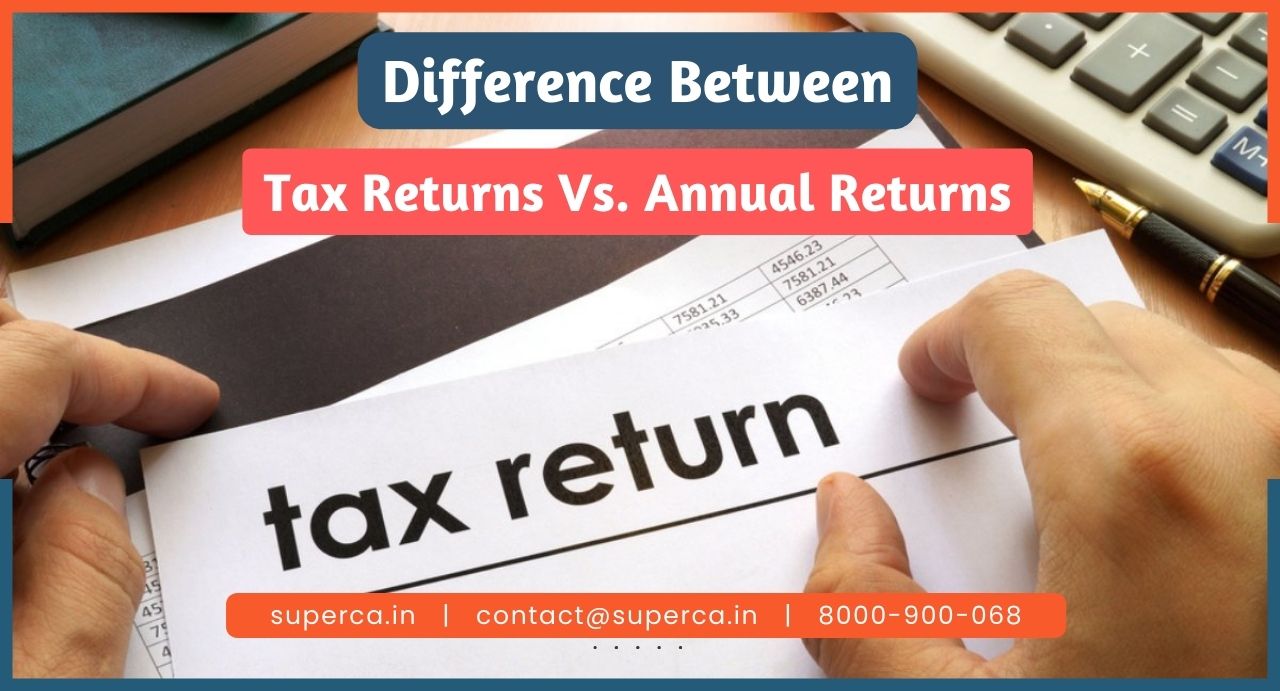Tax Returns Vs. Annual Returns: What is the Difference?


Both Tax Returns and Annual Returns are two different compliances, both have different mechanisms and are submitted to different authorities. The former is the complete tax contribution owed by the individual toward the Income Tax Department and the latter is done to intimate about their company management via prescribed ROC forms on an annual basis. Hence, it becomes imperative to avoid confusion related to these terms and understand the relevance and implications of both these compliances. In this article we’ll get to deeply learn about both Tax and Annual Returns in a very simplified way.
Income tax laws say that returns must be filed every year by persons/businesses that are earning income during the financial year. This could be in the form of a stipend, profits from business, income from house property or earned through the dividends, capital gains, interests or other like sources. Filing an income tax return is an explicit way of declaring one’s total income. One can file a voluntary tax return even if their income is below the threshold limit but is mandatory for all those who have income above the basic exemption limit under the Income Tax Act, 1961.
| Forms | Applicability |
|---|---|
| ITR 1 (Sahaj) | For resident Individual who have income upto Rs 50 Lakh from Salary/One house property or other sources (eg. Interests) |
| ITR 2 | For Individuals and HUFs having income business or profession, from capital gains, or having foriegn incomes or holding foriegn assets. |
| ITR 3 | For individuals and HUFs having income from business and profession
And presumptive Income in excess of Rs 50 Lakh |
| ITR 4 (Sugam) | For Individuals who opted for presumptive income scheme u/s 44AD/44DA/44AE and have a total income from business/profession upto Rs 50 Lakhs |
| ITR 5 | For Limited Liability Partnerships (LLPs), Association of persons (AOPs), Body of Individuals (BOIs), Trust and people under IT Act. |
| ITR 6 | For companies other than those claiming exemption u/s 11 on charitable or religious purposes. |
| ITR 7 | For people and companies required to furnish return under Section 139 (4A), Section 139 (4B), Section 139 (4C), Section 139 (4D) |
→ Avoids unnecessary penalties and unpleasant consequences.
→ Income Tax Return holds immense legal value. It is recorded with the government.
→ Acts as an Important Document While Applying for Loans
→ Filing of the Income-tax return not only helps you but also helps the nation. The tax that people pay is used by the government to build infrastructure and to improve other facilities of the nation such as medical, defense, etc.
ROC returns are financial statements or annual returns of a company that must be filed on time to the registrar of companies with the MCA each year. Filing ROC returns means filing of audited financial statements and annual returns, by every company registered in India, including private limited, limited company, OPCs and section 8 companies. It is mandatory for companies to intimate about the management via prescribed ROC forms on an annual basis, just like an Income tax return is submitted to the Income tax department. As per Companies Act, 2013, non-filing of annual return is an offense. Hence, it is indispensable for a company to file the annual return with the MCA within 60 days of the Annual General Meeting and within 30 days for a Financial Statement.
The timely and yearly filing of Roc forms avoids the burden of penalty, which may arise due to non-filing as required by the Companies Act, 2013 law
| Form | Description |
|---|---|
| ADT-1 | Filed for auditor appointment |
| AOC-4 AOC-4 CFS | Annual Accounts |
| AOC-4 (XBRL) | Annual Accounts in XBRL mode |
| MGT-7 | Annual Return |
| CRA-4 | Cost Audit Report |
| MGT-14 | Filing of resolutions with MCA about the approval of Board Report and Annual Accounts. |
Both Tax and Annual Returns have a special significance on Indian Companies. Although they are both considered as compliances, they are totally different in terms of objectives. Income tax is a tax on an individual’s total annual earnings or the profit from a business entity. Annual Returns is essential as it helps in compilation of accounts for the entire year which analyzes the financial position of the company. It also gives proof of the existence of your company. Hence, it is pertinent to complete both the necessary compliances at year’s end before the due date.
Suggested Read:
What Is Form 16 And How To File Your Income Tax Return Online?
Impact Of Filing Wrong Income Tax Return And Its Solutions
Goods and Vehicles Can’t Be Detained Due to Non-filing of Tax Returns

|
Essential LLP Registration Documents: A Complete Checklist for Entrepreneurs Author: Rahul Singh 04 Apr, 2024
|
Get inspired by these stories.